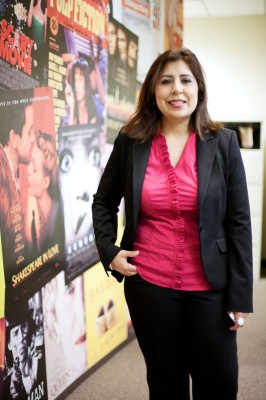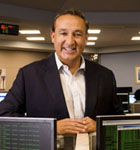
Susana Alonso, director of human resources for the film studio Miramax, is a natural people person. Her networking and communication skills may be a result of early environmental pressures: Alonso is the second oldest of seven siblings, and her family moved to the United States—Culver City, in Los Angeles County, to be exact—when she was four years old (Alonso was born in Michoacán, Mexico). After graduating from high school, she attended California State University, Long Beach and majored in business administration with an emphasis in human resources (HR). After graduation, she interned at the Coca-Cola Bottling Company, where she discovered her ideal career path: working and helping people within a business environment. She found her way into the entertainment industry, and after stints at Sony Pictures Entertainment, MTV Networks, NBCUniversal, and the Game Show Network, Alonso joined Miramax as HR director in 2011, helping manage its staffing needs since its sale by Disney.
How I view HR is that I always like to treat my employees the way that I would like to be treated. If I was not in HR, what type of service would I want from an HR professional? So, I put myself in the position of the employee and at the same time I wear my strategic hat. I think about where the business is going and try to think strategically, to be a real business partner to the senior executives. But, at the end of the day, I love helping people and that’s why I gravitated toward human resources, where you’re dealing with a company’s biggest assets—the employees.
On The Agenda
Typical workday in the life of Susana Alonso
9 a.m. Get in, check e-mails, and phone calls. Review my calendar for the day. If there is anything from our UK office respond immediately because of time difference
10 a.m. Return any calls that are urgent and respond to urgent e-mails immediately
11 a.m. Check in with my boss and see if there is anything urgent that day that was not planned and discuss a plan to resolve it
11:30 p.m. Check in with my interns and see if they have any questions on any of their projects that day
12 p.m. Grab lunch
1 p.m. Work on staffing, benefits implementations, or payroll issues
3 p.m. Check in with the hiring managers of all the open positions I’m recruiting for and give status update on open positions
4 p.m. Check in with boss for any other “fires” we need to put out that day
5 p.m. Respond to new incoming e-mails and/or calls
6 p.m. Plan for the next day
7 p.m. Go home
There was a business club in college that helped me form the professional person that I am. It’s called the Hispanic Student Business Association (HSBA), and it’s a great organization for students who are minorities going into a big university. It helps you develop business skills, public-speaking skills, social skills, so that was extremely helpful and I was very thankful for it.
I fell into the entertainment industry. I was working for a great company, but wanted to move onto something bigger. I networked within PIHRA [Professionals In Human Resources Association], a human-resources organization that I belonged to, and someone there told me about this opportunity at Sony. They submitted my résumé and I got the job. I worked there for four years, starting off as an assistant and getting promoted to coordinator. The experience of working in a variety of roles gave me a great foundation in what HR was all about.
You deal with more egos in the entertainment industry. Creatives can sometimes be challenging, but at the same time it’s fun. And, in any industry, you’re going to work with difficult or challenging personalities. I worked for six years at MTV Networks and loved the culture there. My role was as a recruiter (alongside diversity outreach) for their West Coast office—the fun side of HR, bringing people on rather than firing or disciplining anyone. It was very rewarding.
I love how businesses work—the whole psychology behind what makes a company successful and what doesn’t. Is it the leadership, the product, the service that you offer? I’m fascinated by the bigger picture of working within a business.
One thing that’s helped me in my career and that I feel very lucky to be a part of is The Imagen Foundation. I’m on the board of directors for this nonprofit organization, and I was the youngest board member when I joined in 2000; all the other members were VPs, attorneys, senior execs at studios, and I was just an HR manager. It’s an organization that focuses on portraying Latinos in a positive light in the media and we help Latinos break into the industry, since it’s a very relationship-driven industry and sometimes difficult to access.
To be successful in HR, you should build a really strong network of professionals around you at different levels, acquire some mentors, and have a support system in place. Take chances, take risks, ask questions, always continue to learn, and be very passionate about what you do.

